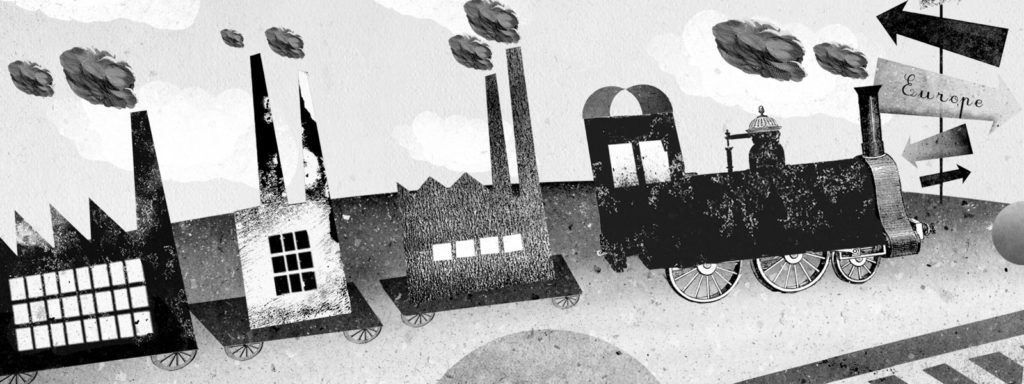
Julian Assange
621 weeks of deprivation of liberty for telling the truth
621 weeks of deprivation of liberty for telling the truth
Illustré par :
Italian public figure and comedian, Beppe Grillo founded the 5 Star Movement (M5S) in October 2009. Huge crowd success. First electoral successes in 2012. In the 2013 general election, the M5S took 23% of the vote and sent a signal to all of Europe of outspoken opposition to the austerity imposed by its government of unelected technocrats parachuted in by the European Commission and the banks. But the politicians in power do not see it that way and maintain the status quo.
Serge Latouche, professor emeritus of economics at the University of Orsay, growth objector, admirer of Italian painting and connoisseur of this country where he has taught on many occasions, was in Brussels on May 7(1). We asked him some questions about the political significance of the M5S, the situation in Italy, the euro crisis and how to get out of it.
Kairos (K.): What is the political significance of the M5S in your opinion?
Serge Latouche (S.L.) : There are Italian specificities to take into account in order to understand what this movement is. It is important to note that the Italian political class is particularly cut off from the popular base, called « la casta » [la caste], and despised. Since 1945, Christian democracy has dominated Italian political life. Its emblematic figure, Giulio Andreotti, who just died on May 6, 2013, was 7 times head of government and was appointed senator for life in 1991.He was an unstoppable figure despite proven collusion with the mafia. The collapse of Christian democracy after the « mani pulite » operation did not lead to a recomposition, a great sweep as Mélenchon speaks of, of the Italian « casta ».
The Italian Communist Party, which in the 1980s was still the leading political force in Italy, has suddenly gone from a tradition of exemplary Euro-communism, with great figures such as Enrico Berlinguer, to what looks like a sort of antithesis. They have lost their way, committed political suicide, transformed into a social-liberal party now called the Democratic Party. They present themselves as the center-left, but it is actually a center-right. This is worse than the drift of Labour in England.
 K.: The Democratic Party (PD) split in two when President Giorgio Napolitano’s term was extended.
K.: The Democratic Party (PD) split in two when President Giorgio Napolitano’s term was extended.
S.L.: G. Napolitano, an ex-communist, and the PD finally preferred an alliance with S. Berlusconi, who represents the worst in European politics, rather than compromise with the M5S. There was, however, a compromise candidate who made the agreement between the PD and M5S that Bersani (2) accepted: it was Stefano Rodotà, a professor of public law who has played a role in international institutions, who is a respected and respectable person. Beppe Grillo supported his candidacy and the M5S voted for him in the first rounds of the presidential elections.
If Rodota was not elected, it is because there was a defection of a whole part of the PD led by Massimo D’Alema, ex-communist, and now close to Silvio Berlusconi. Just think that Mr. D’Alema said: « No more demonizing Berlusconi » and that he and the elected members of the PD gave up passing an anti-corruption law when they could to protect their own interests. It’s pathetic.
Beppe Grillo has always said that he would support political proposals on an ad hoc basis, he did not want to participate in the government, but if the proposed laws seemed to him correct and went in the desired direction, he would vote for them. So the M5S did not say that it wanted to block the institution. G. Napolitano wanted a stable government of union to reassure the financial markets. And he wanted to put Berlusconi back in the game.
K.: So it is not an exaggeration to say that the M5S was properly blocked by those who were already in place, that there was an agreement to prevent the emergence of the political signal that the M5S constitutes.
S.L.: Of course. This is exactly the preservation of the caste against the aspirations clearly expressed by the Italian people in the elections. This is absolutely turning your back on that signal.
K.: What do you consider the most relevant and least relevant elements in the M5S? There are things that seem to go in different directions, there is also a desire not to cling to a particular tradition, how do you analyze this?

S.L.: It is essentially a protest movement which, contrary to what is said in France, is not something that appeared overnight. Beppe Grillo is one of the few people who have really fought against Silvio Berlusconi for years.
He refused to appear on Berlusconi’s television, and he still refuses. His media access was achieved only through a blog that was followed by millions of people in Italy, and it was on this blog that there was a strong criticism of Berlusconi. Only a few personalities on the left were so critical.
Beppe Grillo is a charismatic character who created this movement, which rests entirely on his very broad shoulders. He has a declared sympathy for degrowth, he has a link with Maurizio Pallante who set up the movement of the happy degrowth [Movimento per la decrescita felicce(3)]. He doesn’t display it as strongly now because even in Italy, even in his own mouth, degrowth is scary or is not a catchphrase. But it has a program which on several points is in line with the programs proposed by the degrowth movement: massive reduction of working time, unconditional minimum income, relocation of activities, etc.
K.: There is one side that challenges us, the massive use of electronic communication technologies, including for democratic control, the abolition of a series of intermediate institutions and of cities with less than 5,000 inhabitants. Intermediate institutions play a crucial role in democracy. Is this not a slippery slope?
S.L.: It is not the individual inclinations of a single person that can constitute a political program. This is the limit of Beppe Grillo’s exercise: he channels a movement, he already has a political existence and in order for him to influence the government in a certain sense, it is up to the game of democracy to specify a certain number of orientations that go beyond the person of Beppe Grillo. He has a strength of proposal, he can have excellent ideas. I must say that even Marine Le Pen can have excellent ideas, although there are obviously things that must be resolutely fought, and that
Besides, there are people you can trust and others you can’t. The epithet of « populist » abusively used in the media can hide the best and the worst.
K.: The new Prime Minister, Enrico Letta, is now using growth as a pretext; is it relevant for a growth objector to consider the exit from the current crisis without a period of growth to invest in the energy transition for example?
S.L.: It is relevant to denounce the double imposture of « rilance », a neologism coined by Mrs. Lagarde that contracts rigor and recovery. There is no need for austerity, which is in fact austerity, nor for growth. Obviously, we must not confuse the revival of growth with the need to get out of the crisis, i.e. the revival of activity. In this second case, it is not a question of getting back on the trajectory of infinite growth or of making anything grow. Furthermore, the revival of activity requires a massive plan for ecological change, which requires investments in energy, in the conversion of the automobile industry, in the reconstruction of a peasant agriculture, etc. Of course, we need investments in these sectors, but at the same time we need to create jobs on a massive scale, by reducing working hours and relocating activities.
In Italy, many small and medium-sized entrepreneurs are being strangled by the banks, which have been publicly refinanced and are now refusing to grant credit at reasonable rates, especially for small businesses with less broad shoulders. They are driven to bankruptcy and many end up committing suicide. Every week there are suicides for this reason, there is a real desperation. Relocating economic activities means allowing these entrepreneurs to find outlets that are currently occupied by delocalized companies that produce low quality products in poor social and environmental conditions.
K.: But how can we boost activity without growth? If there is growth, how can we avoid the problem of rising energy prices, for example?
S.L.: We will not spare ourselves the blood and tears, which are already flowing. But we can reduce the number of unemployed today, by drastically reducing working hours, by putting up protectionist barriers to stop the haemorrhage, by launching an energy conversion plan, including a budget deficit not financed by borrowing from banks, but financed by a « gentle rise of price level », i.e. by printing money. It’s still scandalous: everyone
seems to be nostalgic for the thirty glorious years, but the secret of the success of the thirty glorious years was precisely inflation and protectionism. Things that are absolutely forbidden in today’s liberal dogma.

K.: But inflation still implies growth?
S.L.: Inflation here is synonymous with financing a budget deficit. If we make a reconversion plan, it costs, it must be financed, it must also cover social expenses, public services. In times of prosperity, taxes must cover expenditures, but in times of crisis, expenditures must be maintained, taxes must not be increased, therefore the deficit fills the holes. We must not sacrifice public services, sell the crown jewels as is done everywhere, that is austerity.
K.: Do you think default is a feasible option to get out of the debt crisis in Europe?
S.L.: Well, yes! We’ll get there, so it’s best to decide. There is a monstrous hypocrisy in this. We know that neither Greece, nor Portugal, nor Spain, nor Holland, nor France, nor perhaps even Germany will pay their debts. But the perversity is that we are forced to act as if, that is to say, to cut, cut and cut again the expenses in order to make people believe that we are going to have surpluses to refinance the debt. What the Greek experience shows is that the more we cut expenses, the more we cut revenues and the more the debt increases. As the debt grows by its own interest mechanism if we are not able to pay the annual instalments, we end up in a situation equivalent to that of the Third World in the 1980s, with a growing deficit.
K.: So a state would have to decide to default unilaterally, to create a virtuous loop, because if nobody starts…
S.L.: It could also be several states together. Iceland has already done so. It is a « micro » state, but it is extraordinary. The President of the Icelandic Republic, invited to Davos, said that he had the recipe for this crisis and he advanced the default of payment. The newspapers did not mention it of course. But the Icelandic economy has recovered, the formula has worked very well. This story is extraordinary, because there are countless historical examples of states going bankrupt. From Charles V, who went bankrupt twice, to the France of Louis XV and the Revolution, to Argentina in 2000 with the Peso. The world has not stopped turning, however. On the contrary, bankruptcy allows you to reset the meters to start again. There is a very interesting measure in the Torah: the sabbatical year. During the sabbatical year, all debts are cancelled, the counters are reset to zero. The text of the Torah is very explicit on this point, it says that in order for him that there are no poor people in Israel, that there is not too much difference between rich and poor, every 7 years the debts are cancelled(4).
It is a practice repeated in history, either the debts were eliminated by persecuting or exiling the Jewish or Lombard creditors and confiscating their goods, this was traditional in France and Spain for a certain period, or the debts were simply cancelled.
It is the hypocrisy that leads to not wanting to say that we will not pay the debt…

K.: In the case of countries defaulting, it would a priori be those in the South of Europe. In that case, wouldn’t we be heading towards a powerful Euromark zone on the one hand and a dilapidated Southern Europe on the other? Is the end of the euro and the return to national currencies not the symbol of the end of European solidarity?
S.L.: Solidarity does not exist today, if we are in this crisis, it is precisely because there is a crisis of solidarity.
K.: That’s true, but one could imagine maintaining the Euro through solidarity.
S.L.: Finally, the euro is twelve years old. We have lived for centuries without the euro. Since we made a mistake when we did it, we can either do it again in a different way, or we can get out of it, but in any case we have to get out of this euro. This is scary. There is a paradox: the Greeks, for example, reject austerity, but according to the polls, they overwhelmingly want to remain in Europe. It’s the same for the Italians. I too want another Europe. I want a Southern Europe, and I find Giorgio Agamben’s words on this subject interesting(5). We can find agreements with our first cousins, but I always say: the Latins are our brothers, the Germans are our cousins.
Interviewed by JB Godinot on May 7, 2013.